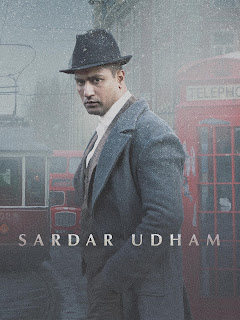Sardar Udham Review:- A Director's brilliance
When you live across a time where the movie industry is on a marathon to launch new biopics and heart-thumping jingoistic patriotic movies, it is quite a wonder to watch Sardar Udham, one of the best biopics produced in India. Coming from the acclaimed Shoojit Sircar, the biopic on Sardar Udham Singh, can literally be never classified as a Hindi movie.
The plot of the movie delves into the journey of Sardar Udham Singh, known for assassinating Michael O’Dwyer in London to avenge the Jallainwala Bagh massacre of 1919 and the court proceedings that continue. It would be quite a cumbersome process to speak of a biographic plot, which keeps on shifting to different timelines in a non-linear format, yet keeps the viewers glued.
What makes Sardar Udham, a step apart from every other biopic is something that should be discussed:-
Treatment:- As mentioned earlier that the movie cannot be classified as a Hindi movie because language is just considered as a medium to converse with another character, rather than a translation for the audience to understand. So every character sticks to their original tone, even broken English which gives the scenes originality. This treatment removes the language tag and the viewers get an experience of watching an incident as a witness.
Genuine Storytelling:- It has become a trend over years to make a biopic to either boast a person (You Know Who) or whitewash a person’s deed (like Sanju). Similarly, Patriotic movies have followed a repeated trademark of displaying high octane patriotism, which often becomes cringy, at the cost of attacking another nation or religion (The recent Bhuj, The Pride of India). It is the director’s brilliance to step away from all these commercial formats to tell a story of a lesser-known person, until now. Neither there is the chant of Bharat Mata ki Jai or Vande Mataram by the characters to portray their emotions, nor a targeted attack on other nations to boost India, but the dialogues have come from the real-life court hearings and the archived case files.
Commercialization:- If the basic objective of a movie is to tell stories of a person or an incident, what is the need for intense masala or songs. It is true that such factors add to the Boxoffice potential of a movie, but it often dilutes the story as well as the mood. The template chosen by Shoojit Sircar for Sardar Udham is an off-beat one, which is, in my personal opinion the best, when such stories are told. But that too depends on the director’s skill to make it engaging, or else it could easily turn into a documentary,
Surprise:- The biggest surprise of the movie would have made it difficult for a theatrical release without cuts. No other movie has ever shown such a realistic and violent portrayal of the Jallianwala Bagh massacre, a black day in Indian history, which has never been shown for more than 3 minutes ever in movies. The violence, pain, agony, and helplessness of the people and the characters will leave a lump in the throat.
Ideology:- A number of portrayal of Bhagat Singh has often come on big screens and mini-screens but never has it been portrayed with such maturity. His progressive beliefs in humanism and equality, the difference between revolutionaries and terrorists, etc. have been perfectly referenced from Bhagat Singh’s essay Why I am an Athiest.
Very rarely do we come across such works of brilliance where the objective is to showcase, rather than encash. The presentation of stories in this template is not new to Director Shoojit Sircar, whose previous works Madras Cafe and October are the living references. Vicky Kaushal as an actor has excelled in the portrayal of Sardar Udham Singh and this one deserves an award for the sincerity. India, over the last few years, except one or two, has been consistently selecting quality works for Oscars, and if Sardar Udham gains India’s Official Entry tag, there stands a chance of hope for its internationalism.
Streaming now on Amazon Prime.

Comments
Post a Comment
If you have any queries, then please let me know